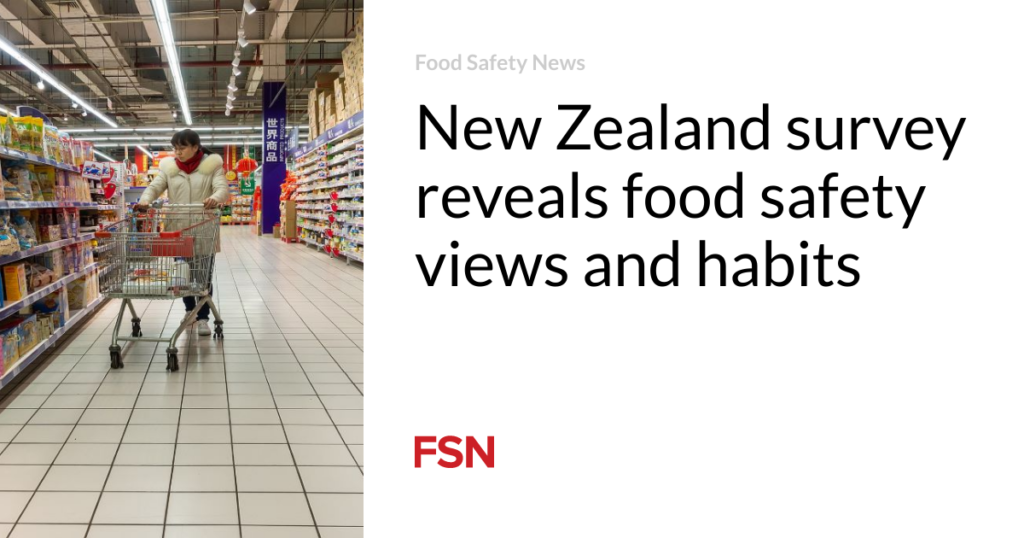A New Zealand consumer survey found that food poisoning was the second highest food-related concern after price.
Overall, 56% expressed concern, suggesting food poisoning is being taken seriously, according to the New Zealand Food Safety Authority (NZFS), an arm of the Ministry for Primary Industries (MPI).
The online survey was conducted in November and December 2023 among 1,602 consumers.
The NZFS wanted to know how consumers from different backgrounds perceive food safety risks and how their risk perceptions influence their food safety behaviours and practices. A total of 27 food safety practices were tested in the study.
The results of consumer behavior
67% of consumers who prepare chicken say they sometimes or always wash raw chicken, while 79% incorrectly believe raw chicken should be washed or are not sure whether it should be washed. The main reasons for washing chicken were for hygiene or to avoid foodborne illness.
Many respondents don't wash their hands after handling eggs and don't warm frozen berries before using them. Those who didn't follow the correct cooking or plating steps said they didn't have the time, didn't realize they should, didn't think it was necessary, or forgot. Most respondents own meat thermometers but don't use them often.
Two-thirds feel they have enough food safety knowledge to avoid foodborne illness. Those who feel unconfident are more likely to be 15-29 years old, Pacific Islander, and/or Asian. Foodborne illness incidence increased from 9% of households in 2020 to 15% in 2023.
When asked how to safely handle food to avoid foodborne illness, consumers are most likely to trust government agencies and health professionals. To find out safe food storage information, people are most likely to search the internet or talk to others.
Nearly a third said they had eaten food past its expiration date, and more than half recalled hearing about a food recall in the past 12 months.
Level of Trust
Most consumers believe New Zealand has food safety regulations, but few believe the regulations are overseen. Half of respondents are concerned about food safety in takeaway restaurants, and 56% have some, little or no confidence that imported food is safe to eat.
Most people were confident that New Zealand food was safe to eat. People aged 15 to 29, Māori and Asian consumers were less confident that New Zealand food was safe.
Consumers trusted farmers and producers the most for their competence, transparency and care regarding food safety, but had the least trust in restaurants, cafes and takeaways. In the case of takeaways, people were mainly concerned about the lack of hygiene processes and standards, food preparation and cooking methods, and cleanliness of the kitchen and premises.
Since 2020, trust that government agencies have rules to ensure food safety has fallen from 79% who mostly or completely trusted in 2020 to 69% by 2023. Consumers were also concerned about the safety of food from charities and food banks, dairies, bakeries and convenience stores such as gas stations.
Consumers consider chicken, shellfish and pork to be the most dangerous foods. When asked how dangerous certain foods are to other foods, most consumers said frozen berries, rice, eggs, packaged salads and bean sprouts are not high risk.
When it comes to meal box delivery, consumers’ biggest concerns are the risks involved with delivery, such as delivery time and packaging.
The New Zealand Food Safety Authority is also urging people to take practical steps to prevent Listeria infection.
The campaign aims to help those most at risk, such as pregnant women and the elderly, better understand the risks of listeriosis and how to reduce it.
There have been four deaths from listeriosis in 2021 and six in 2022, with 78 people hospitalized during this period. In 2023, there have been three recalls due to the possible presence of Listeria monocytogenes.
High-risk foods include cooked meat products such as deli meats and pâtés, smoked seafood (especially cold-smoked fish), soft cheeses such as Brie and Camembert, unpasteurized dairy products, soft-serve ice cream, some fruits such as melon, leafy greens and bagged salads, raw sprouts such as alfalfa and mung beans, enoki mushrooms, and cooked prepared meals.
To lower your risk of getting listeriosis, cook food thoroughly, eat only freshly cooked foods, refrigerate leftovers promptly, and avoid eating leftovers that aren't reheated.
(Click here to sign up for a free subscription to Food Safety News.)



